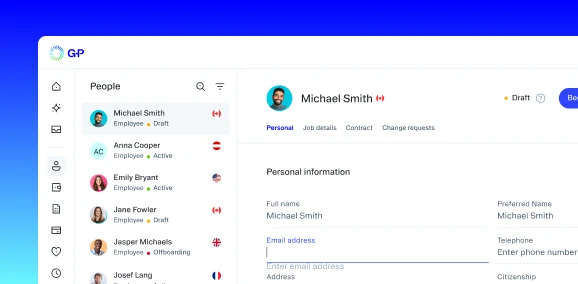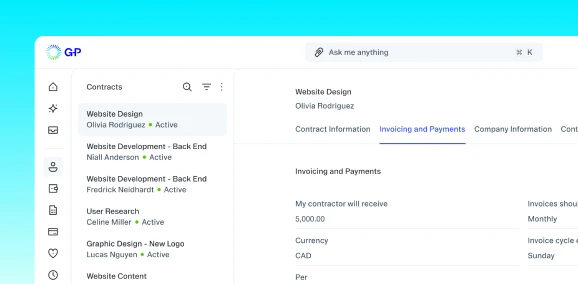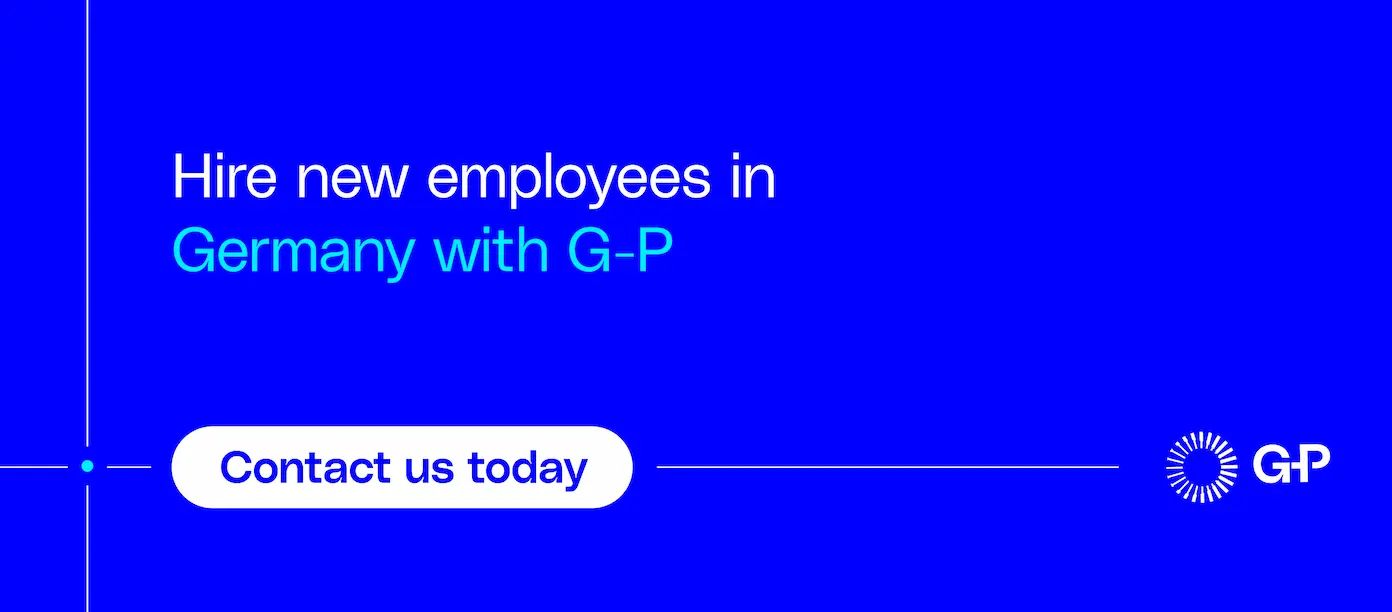Germany has a strong economy and a highly skilled workforce, particularly in automotive and engineering. Its central location provides the perfect gateway to the world’s largest trading bloc: the EU.
Germany is home to the largest consumer market in the EU, but before expanding into this country, you’ll need to understand contracts, taxes, wages, benefits, and other employment laws. Our guide will tell you everything you need to know about hiring in Germany.
What to know before hiring in Germany
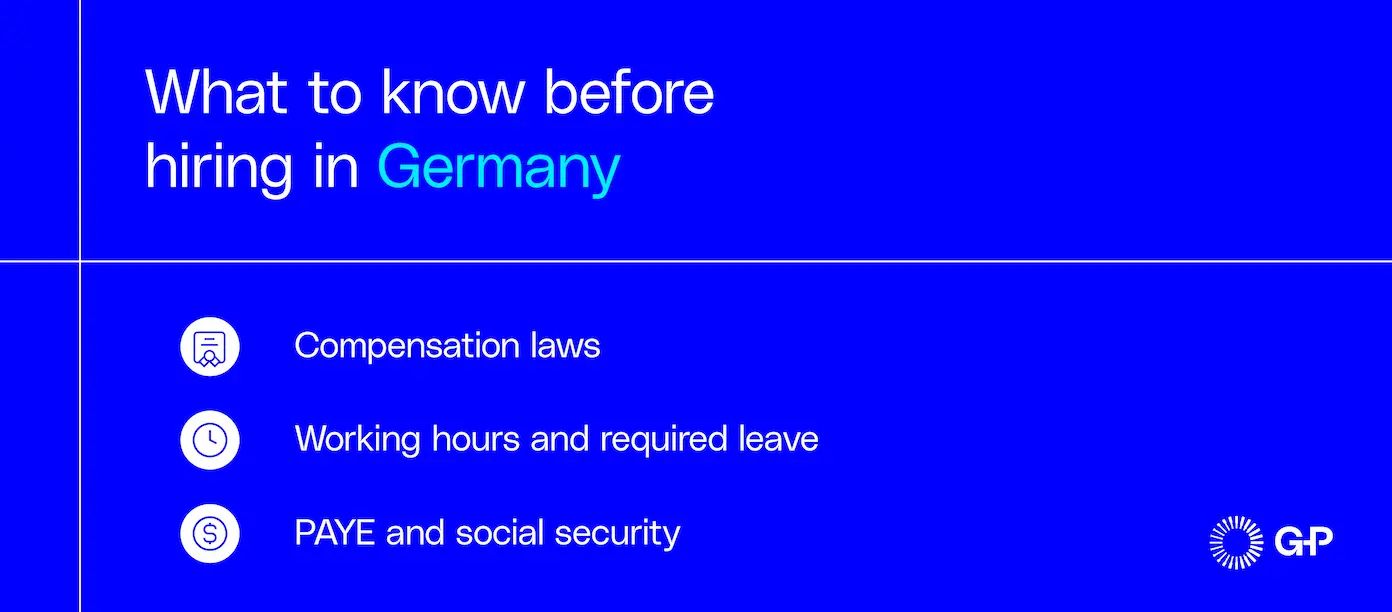
If you’re expanding your business into Germany for the first time, there are important legal requirements to be aware of. These norms and laws influence hiring practices in Germany and many aspects of the employer-employee relationship, including compensation and benefits.
G-P Gia™, our AI-powered global HR agent, can answer your toughest compliance questions across 50 countries — including Germany — and all 50 U.S. states. Reduce your reliance on outside counsel and cut the time and cost of compliance by up to 95% with Gia.
Here are four things to know about hiring in Germany.
1. Compensation laws
Germany’s minimum wage is EUR 12.82 per hour as of Jan. 2025. The rate is periodically reviewed and adjusted by the Minimum Wage Commission. Certain sectors such as construction, care, or cleaning can have higher minimum wages set by collective agreements.
The Remuneration Transparency Act promotes equal pay for equal or equivalent work. It applies to companies with 200+ employees. The act gives employees the right to request information on pay criteria and median pay for comparable roles. Employers have to justify any pay differences with objective, nondiscriminatory factors. Gender pay equity is a legal requirement.
Employers in Germany have to keep detailed records of working hours and wage payments for at least two years. Noncompliance with minimum wage or documentation requirements can result in fines up to EUR 500,000, exclusion from public contracts, and reputational damage. Failure to provide written employment terms can lead to EUR 2,000 fines per case.
2. Working hours and time off
There are nine public holidays in Germany. Some states may celebrate extra holidays. Employees get at least 20 paid working days of annual leave.
Overtime is regulated by the Working Hours Act (Arbeitszeitgesetz). The workday is eight hours. Overtime pay isn’t mandated by law but is usually governed by collective agreements or individual contracts.
Maternity leave is 14 weeks: six weeks before the birth and eight weeks after. Post-birth leave can increase to 12 weeks for premature, multiple, or disabled births. Maternity pay is covered by both employers and statutory health insurance.
There’s no paternity leave in Germany. Fathers can take parental leave (Elternzeit). This is available to mothers too. Parental leave gives up to three years of job-protected leave per parent. If eligible, parents can receive parental allowance (Elterngeld) during this time. This is a state benefit based on previous income. It’s paid for 14 months if both parents take the leave, or 12 months if only one parent does.
3. PAYE and social security
Under the German pay-as-you-earn (PAYE) system, employers withhold income tax (Lohnsteuer), the solidarity surcharge (Solidaritätszuschlag), and, if applicable, church tax (Kirchensteuer) from employees’ wages. The amount of tax is based on the employee’s tax class, income level, and personal circumstances (e.g., marital status, number of children).
Germany’s social security system is mandatory for most employees. The total contribution is about 40% of gross salary, split equally between employers and employees. This goes toward health insurance, pension insurance, unemployment insurance, long-term care insurance, and accident insurance.
4. AUG licensing requirements
AUG licensing refers to Germany’s Employee Leasing Act. This law governs the temporary supply of workers (known as labor leasing or employee leasing) from staffing agencies to client companies. Any company that wants to supply workers to other companies in Germany has to have an AUG license from the Federal Employment Agency (Bundesagentur für Arbeit) before starting operations.
Operating without a license is illegal and subject to penalties. Licensed agencies have to work with all statutory requirements. This includes equal pay and working conditions for workers, proper employment contracts, and social security contributions. The initial AUG license is granted for one year. If the agency demonstrates compliance, it can be renewed for up to three years.
Employers of record (EORs) need a valid AUG license to operate in Germany. G-P has the licensing and expertise to help you hire, onboard, and manage employees quickly and compliantly in Germany.
2026 employee expectations in Germany
Employees in Germany aren’t as concerned about AI or economic factors threatening their jobs. Only 56% are worried about job loss, and 54% feel uneasy about AI skill readiness. However, 39% are seeking or plan to look for a new job in 2026.
Businesses hiring in Germany should emphasize long-term career paths and stability offerings. Integrating training on new technologies into daily workflows is a powerful way to prepare employees for AI adoption, without disrupting the current sense of security.
Top hiring hubs in Germany
Some cities in Germany are known for particular industries. Knowing what each city has to offer allows you to focus your hiring efforts in the right place and fill roles faster.
The top talent hubs in Germany are:
-
Berlin is a major center for technology, startups, creative industries, and government. The city is known for its cultural scene. It’s more affordable than Munich or Frankfurt, attracting emerging talent from around the country.
-
Frankfurt is Germany's financial capital. The city is home to banks, insurance companies, and international corporations. The European Central Bank, Deutsche Bank, and Commerzbank are located here. Frankfurt Airport is a major transport hub.
-
Hamburg is a hub for logistics, media, and maritime activities. It has a strong industrial base and is Europe's third-largest port. The aerospace company Airbus is located here.
-
Stuttgart is known for its automotive, engineering, and advanced manufacturing industries. It’s home to some of Germany's most famous engineering and car brands, including Bosch, Mercedes-Benz, and Porsche.
-
Munich is a hub for finance, automotive, engineering, and technology sectors. BMW, Audi, Allianz, and Siemens are located here.
Key industries in Germany
Understanding Germany’s main industries allows you to benchmark salaries and benefits. You can use this insight to make smart choices about where to invest and grow your workforce.
The main industries in Germany include:
-
Automotive: Germany is home to famous car brands such as Volkswagen, Mercedes-Benz, and BMW. These companies create many jobs and invest heavily in research and development. Specialist talent includes various engineering roles, material scientists, and service advisors.
-
Chemical and pharmaceutical: Germany is the third-largest exporter of chemicals and has 16% of market share in pharmaceutical R&D. Specialist talent includes R&D scientists, engineers, and quality assurance and quality control specialists.
-
Finance and banking: Frankfurt is the leading financial center in Germany. It’s home to the European Central Bank, Deutsche Bank, and many other international banks. Specialist talent includes fintech specialists, data scientists and analysts, and risk and compliance professionals.
-
IT and telecommunications: Germany's technology sector is strong in cities like Berlin and Munich. Companies like SAP, one of the world’s largest enterprise software companies, is headquartered in Germany. Specialist talent includes software developers, engineers, and cybersecurity professionals.
-
Logistics and transportation: Germany’s central location makes it a strategic logistics hub. Major companies such as DHL and Lufthansa Cargo, operate here. Specialist talent includes supply chain managers, logistics analysts and managers, and custom and trade compliance specialists.
-
Electrical engineering and electronics: Siemens and Bosch are important companies in this field. They supply a range of electronic products for the energy, healthcare, and automotive sectors. Specialist talent includes various engineering roles.
The cost of hiring an employee in Germany
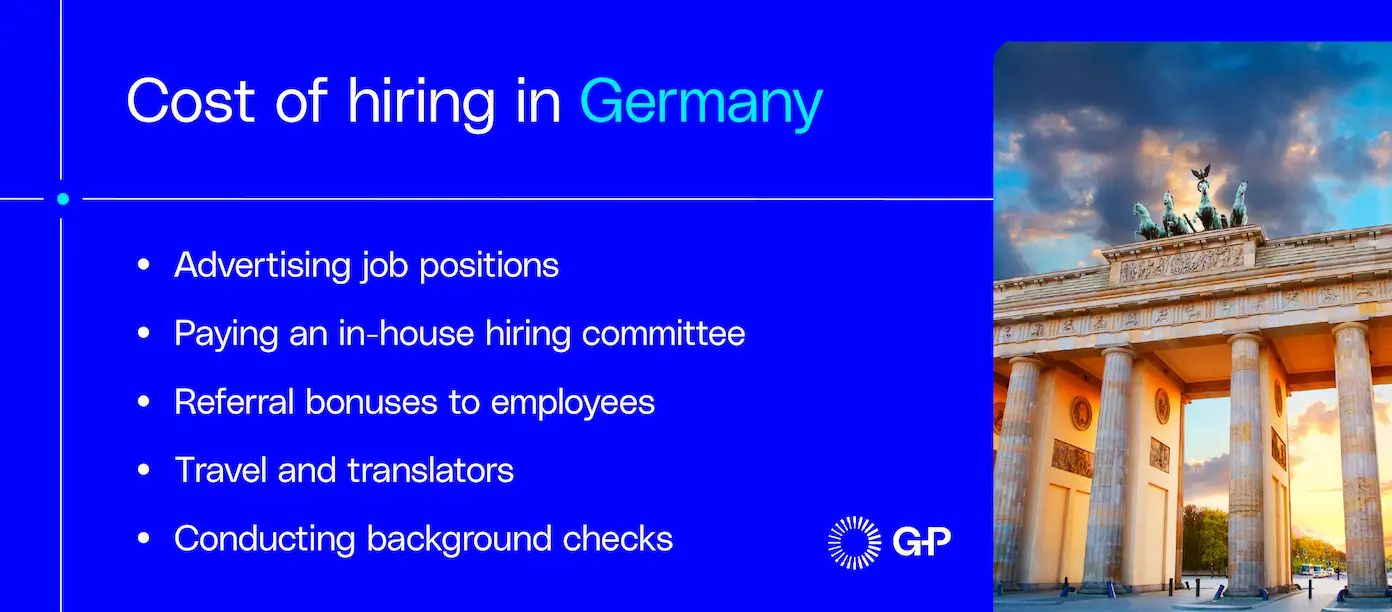
Whether you’re hiring one employee or an entire team in Germany, expenses are inevitable. Budget for the following:
-
Setting up an entity (unless you partner with an employer of record)
-
Advertising job positions
-
Paying referral bonuses to employees with connections in Germany
-
Paying an in-house hiring committee
-
Traveling to and from Germany, including hotel stays, meals, and transportation
-
Partnering with a translator to draft documents or facilitate conversations (if applicable)
-
Using a background check service for screening candidates
-
Drafting compliant employment contracts, legal review, and consultation with HR and legal experts
-
Costs for providing computers, phones, and software licenses
-
Expenses for onboarding materials and initial training
-
Statutory accident insurance (Berufsgenossenschaft) and any extra liability or business insurance
-
Costs for maintaining required tax and payroll records and documentation
According to G-P Verified sources from Gia, the employer burden rate in Germany, which includes costs triggered on top of salaries, ranges from 20–22% (excluding accident insurance).
What does a company need to do to hire employees in Germany?
Make sure you cover these essentials before expanding your team in Germany:
-
Get a tax identification number (Steuernummer).
-
Register for VAT.
-
Get an employer identification number (Betriebsnummer).
-
Register with the Employer's Liability Insurance Association (Berufsgenossenschaft).
-
Register employees for social security.
-
Notify authorities and maintain records.
Setting up a subsidiary in Germany can take weeks or months. Use G-P EOR to hire full-time employees in Germany without setting up your own entity. Build your team at a lower cost and with peace of mind that you’re doing so compliantly.
The steps to hiring in Germany
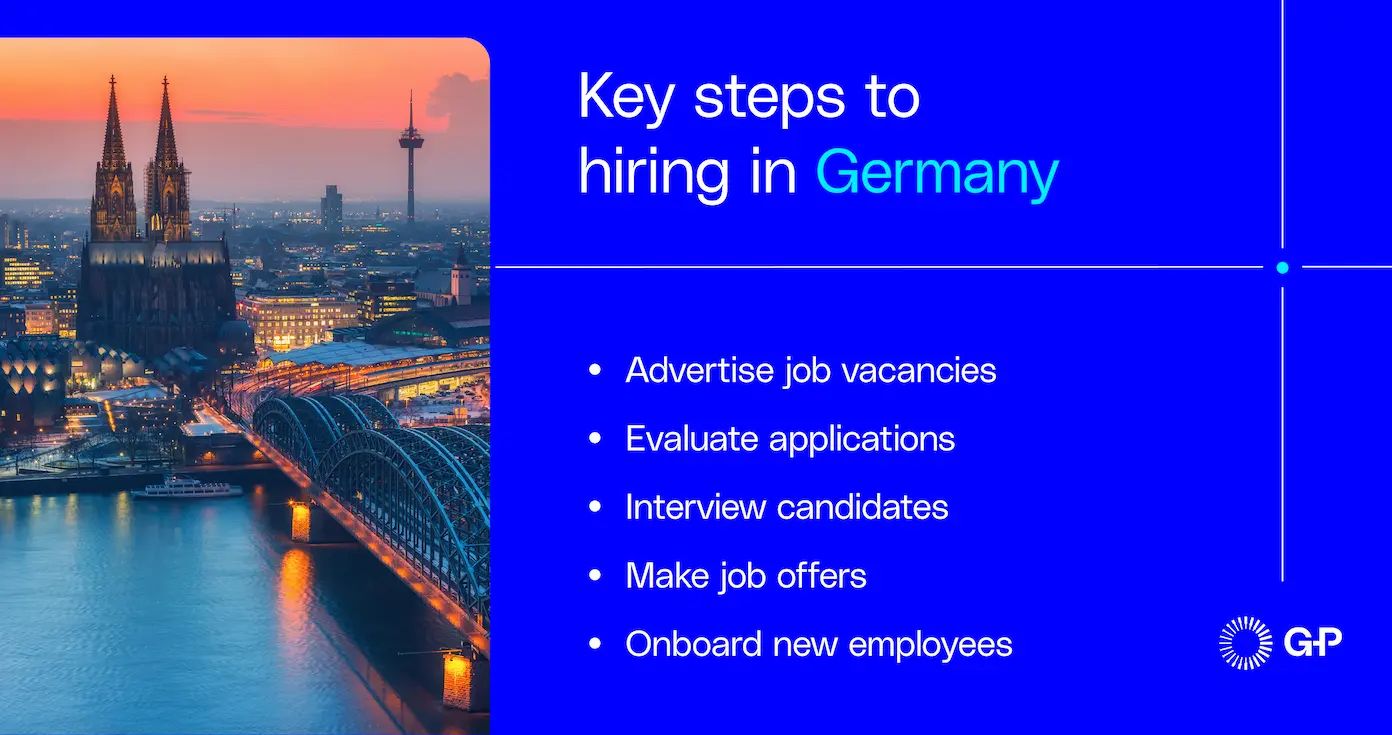
The hiring process in Germany is similar to the one you’re likely familiar with in your own country. The hiring process follows five basic steps: advertising the job, evaluating applications, interviewing candidates, sending job offers, and onboarding new employees.
1. Advertise job vacancies
Clearly outline the job description, responsibilities, and qualifications. Make sure job advertisements comply with antidiscrimination laws like the General Equal Treatment Act. Use neutral, inclusive language and avoid any wording that could directly or indirectly exclude applicants from protected groups. For example, it’s common to use “m/w/d” (male/female/diverse) after job titles to signal inclusivity.
XING, Stepstone, Indeed, LinkedIn, Monster, Glassdoor, and Zuhausejobs are popular job sites in Germany. You can also post vacancies on the Federal Employment Agency portal (Bundesagentur für Arbeit’s Jobbörse) to broaden your applicant reach.
2. Evaluate applications
Gather CVs and application forms. Screen candidates based on qualifications and experience to ensure compliance with privacy and antidiscrimination regulations. Companies with 200+ employees must provide information on salary structures upon request and regularly review pay practices. The EU Pay Transparency Directive, which Germany must implement by June 2026, will further strengthen these requirements.
3. Interview candidates
Interview candidates who made it onto your shortlist. You can do these interviews in person or virtually. Use structured, nondiscriminatory interview questions. Gia can help you create questions that follow antidiscrimination laws in Germany, so you can find the best fit for the role while complying with local regulations.
4. Make job offers
Contact your chosen candidate to offer them a position with your company. Prepare a written employment contract that includes job title, duties, salary, working hours, notice periods, and reference to any collective agreements. Both parties have to sign the contract before employment begins.
5. Onboard new employees
Now you can onboard new employees. Register the new hire for social security and get a tax identification number. Notify the local tax office and the Employer’s Liability Insurance Association (Berufsgenossenschaft).
If you’re working with an EOR like G-P, you won’t have to worry about the administrative burden of onboarding. We’ll streamline the process, so you can focus on training your new hire and integrating them into your company culture.
Hiring contractors in Germany
Working with independent contractors in Germany can be a cost-effective way to test the market and build a presence without the commitment of full-time employees. Contractors based in Germany understand local consumer behavior, rules, and business practices. They’ll be ready to start working quickly with their own equipment and established work processes.
Hiring contractors allows you to easily adjust your workforce based on your business needs, without the complexities and costs of employment.
Before you enter an agreement with an independent contractor in Germany, consider the following:
1. Employees vs. independent contractors
It’s important to understand the difference between employees and independent contractors. In Germany, employers hire employees to do work and, in return, pay them a regular salary and benefits. Independent contractors provide services. Unlike employees, contractors set their schedules, use their own equipment, and work on specific projects, rather than having an ongoing role.
2. Penalties for misclassification
Classifying someone as a contractor when they’re not can lead to severe penalties. If misclassification occurs, you’ll have to:
-
Pay employer and employee social security contributions for up to four years (or up to 30 years if the misclassification was intentional), plus interest.
-
Pay administrative fines. These can reach up to four times the unpaid contributions. Severe, intentional violations can be fined as high as EUR 10M.
-
Face imprisonment for up to five years (or 10 years in severe cases) for intentional misclassification.
3. How to pay contractors in Germany
G-P Contractor™ takes away the messy, time-consuming process of hiring and paying international contractors. You can create and issue contracts and pay contractors with just a few clicks, all while ensuring a compliant process.
Hire employees and contractors in Germany with G-P
Our SaaS and AI-powered products – EOR, Contractor, and Gia – support companies as they build and manage global teams.
G-P is the recognized leader in global employment with more than a decade of experience, the largest team of HR, legal, and compliance experts, and a global proprietary knowledge base.
Make your expansion to Germany easier with G-P. Contact us or book a demo today.
